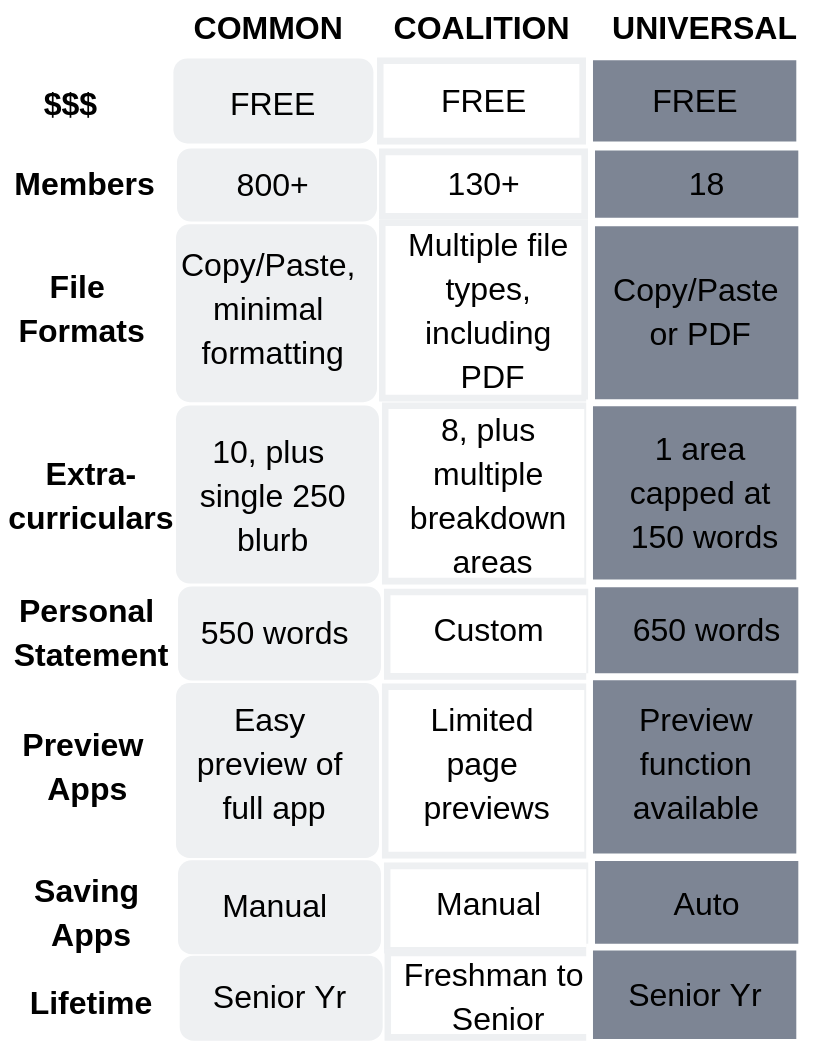Common App, Coalition, or Universal?

Considering the amount of work that has to go into every application for each college or university (which should be at least 5!), the last thing you want to exert brain power on is which application platform you should use.
Unfortunately, you need to.
Let’s make it easier, though. There are pros and cons to each application platform, not to mention that they were developed for different reasons. Let’s break each one down and see which one is best for your needs.
Common Application
The Common Application covers the broadest range of colleges and universities, featuring undergraduate applications for more than 800 institutions through the US, Canada, China, and Europe. This undergraduate application platform is for both first-time college applicants and transfer students, making it a very versatile option. It was primarily designed for students in their senior year. Accounts made prior to August 1st of senior year will have to undergo a rollover process, which is a relatively new feature, and is not intended for students to begin applications early since certain information may not migrate.
Pros:
Common App is completely free to use. While many institutions will still require an application fee, using the platform itself won’t require a credit card.
It sends out system alerts when deadlines are approaching to keep you on track
Keeps a requirements tracker for each application (such as for school's FAFSA deadlines)
Allows you to self-report on test scores
Comes as a mobile application, which can keep task lists and give you alerts
Provides a virtual Counselor
Offers services in Spanish
Been around since 1975, so they have significant experience
Cons:
Because it is so easy to fill out multiple applications without much expended effort, colleges are relying more on demonstrated interest — i.e. visits to the institution, following their social media accounts, direct contact over phone or email — to determine whether students are serious about attending.
There has been some uncertainty regarding whether undocumented immigrants can use the Common App.
Coalition for College
Coalition for College or, as it’s mostly known, Coalition, was designed to be more of a longer term tool. Coalition has more than 130 member colleges and is free to use. While most platforms can be used for as long as students want, Coalition offers features better suited for long-term use, including online tools such as MyLocker, which is private digital storage for essays, projects, and powerpoints to keep in mind for application time.
While the basics of the Coalition and Common application are the same, Coalition college membership is much more selective. It was all founded on the idea of serving underrepresented high schoolers without access to everything they need to apply for college, so every college and university has to meet measurements for access, affordability, and success.
Minimum Member Requirements for Coalition Members:
Must have a minimum of 10% of the student population that is underrepresented or minority
National Student Loan debt must be less than $30,000 with a loan default rate of 15% or less
Graduation rate for low income or underrepresented students must exceed 50%, overall graduation rate must be 60% or higher.
There are a few more nuances to the requirements, but this is the gist.
As for the application itself, like the Common App, it has pros and cons.
Pros:
More selectivity on member colleges and universities ensures that students are applying for colleges that offer a relative degree of access, affordability, and success
Coalition is free to use
Offers MyLocker that students can begin using at a young age to keep track of documents and more for application season
Features the Collaboration Space, which is an area for students to connect with trusted adults for input on their applications
You can submit a variety of file types as part of your college application, including PDF, multimedia, and more
Provides MyCoalition Counselor as a resource for students to find out more about financial aid, essays, applications, and more.
Mobile-friendly
Cons
Coalition only began accepting applications in 2016, so they’re definitely newer to the game
While the Coalition site is mobile-friendly, there’s no mobile app for it yet
Fewer schools to apply to — this is a pro and a con, considering the selectivity, but it does provide fewer options for students.
Universal College Application
The Universal College Application, usually just referred to as the Universal App or UCA, functions similarly to both the Coalition App and Common App—it’s a platform for students to submit undergraduate college applications. It offers the same ability to fill out personal information once, keep all applications in the same place, and create task lists to stay on track. However, UCA has a limited amount of members, currently only hosting applications for 18 institutions.
Pros:
The UCA interface is fast and intuitive
Free to use
A number of Ivy League schools accept applications from UCA
It offers applications to two schools that Common App doesn’t: University of Charleston (WV) and Landmark College
UCA has been around since 2007, making it more experienced than Coalition
You can edit essays after you submit
Auto-Save feature to prevent loss of information
Cons:
The very limited number of colleges and universities available to apply to
Teachers and counselors won’t be as familiar with the process, so you may have to go this route alone
The applications don’t require recommendations, even when the colleges and universities do, so they will let you submit without one
So, Which One Do I Use?
The most common of these three is the Common Application, thanks to its massive college and university membership amount. The Coalition Application can be a great option for students who need more flexibility in their submitted application, such as art majors submitting media. The Universal application, in a funny turn of events, is not as “universal” as the other application options, but can be great for select students interested in applying to their member selection. Meaning, ultimately, it depends on your situation.
For you convenience, there’s a handy cheat sheet below on the little nit-picky particulars! Happy applying!
